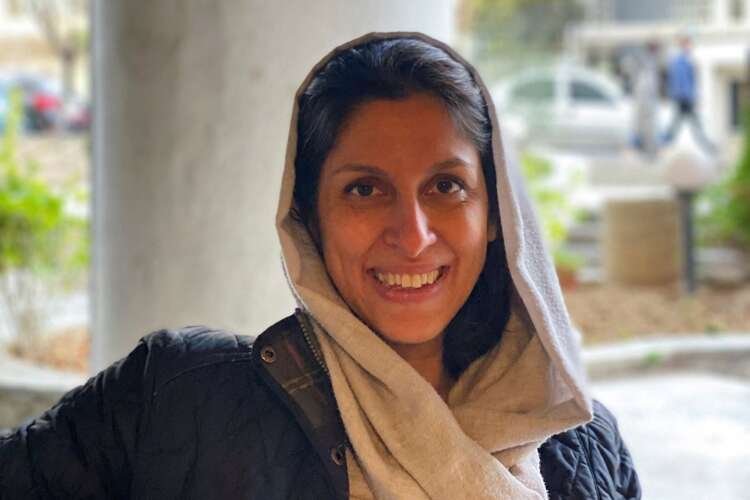Zaghari-Ratcliffe, fellow British-Iranian freed to return to UK


By Parisa Hafezi
DUBAI (Reuters) -British-Iranian aid worker Nazanin Zaghari-Ratcliffe and dual national Anoosheh Ashouri flew out of Iran on Wednesday, ending a long ordeal during which they became a bargaining chip in Iran’s talks with the West over Tehran’s nuclear programme.
Omani state television said the pair had arrived in the capital Muscat following their release in Tehran.
Earlier, a video aired by Iran’s Tasnim news agency, affiliated to the elite Revolutionary Guards, showed a woman dressed in black Iranian Islamic clothes, boarding a Royal Air Force of Oman aircraft.
“I am very pleased to confirm that the unfair detention of Nazanin Zaghari-Ratcliffe and Anoosheh Ashouri in Iran has ended today, and they will now return to the UK,” Prime Minister Boris Johnson said on Twitter.
Zaghari-Ratcliffe’s husband Richard and the family of Ashouri did not immediately respond to a request for comment.
Antonio Zappulla, CEO of her employer, the Thomson Reuters Foundation, said her release was “a ray of light and hope” at a time when the world was in turmoil. The foundation is a charity that operates independently of Thomson Reuters and its news subsidiary Reuters.
In February, as months of talks on reviving a 2015 nuclear deal inched closer to an agreement, Iran, which holds a dozen of Western dual nationals, said it was ready for a prisoner swap in return for the unblocking of frozen assets and release of Iranians held in Western jails.
The nuclear talks were close to an agreement 11 days ago until last-minute Russian demands for sweeping guarantees that would have hollowed out sanctions imposed following its invasion of Ukraine threw the negotiations off track.
Russia now appears to have narrowed its demands to cover only work linked to the nuclear deal, leaving a small number of issues to be resolved between Washington and Tehran, diplomats say.
TANK DEBT
Iran’s semi-official Fars news agency said Zaghari-Ratcliffe and Ashouri were freed after Britain repaid a historic debt.
Iran’s clerical rulers say Britain owed Iran 400 million pounds ($520 mln) that Iran’s former monarch, the Shah, paid up front for 1,750 Chieftain tanks and other vehicles. Almost none of which were eventually delivered after the Islamic Revolution of 1979 toppled the U.S.-backed leader.
British Foreign Secretary Liz Truss Britain had been looking at ways to pay the debt, which related to the sale of main battle tanks to Iran’s former ruler, the Shah.
“We have the deepest admiration for the resolve, courage and determination Nazanin, Anoosheh and Morad, and their families, have shown. They have faced hardship that no family should ever experience and this is a moment of great relief,” she said in a statement.
“In parallel, we have also settled the IMS debt, as we said we would,” she added, referring to the debt for military equipment. She said the debt had been settled in full in compliance with international sanctions on Iran and the funds would be ring-fenced for buying “humanitarian goods.”
Iran’s top diplomat Hossein Amirabdollahian on Wednesday said Britain had paid its debt a few day ago, denying any links between the payment of the debt of $530 million and the release of the prisoners.
Iran’s judiciary and Britain confirmed the releases and state media said Zaghari-Ratcliffe and Ashouri were handed over to a British team at the airport and left Tehran.
Separately, Iran’s state news agency, IRNA, said detained Iranian-American environmentalist Morad Tahbaz, who also holds British citizenship, was also released on furlough on Wednesday.
“This day has been a long time coming and we are thankful for the efforts of everyone involved in bringing Anoosheh home,” his family said in a tweet.
“1672 days ago our family’s foundations were rocked when ourfather and husband was unjustly detained and taken away from us.”
ILL-FATED VISIT
Zaghari-Ratcliffe’s protracted difficulties began with her arrest by Revolutionary Guards at Tehran airport on April 3, 2016, while trying to return to Britain with her then 22-month-old daughter Gabriella from an Iranian new year’s visit with her parents.
She was later convicted by an Iranian court of plotting to overthrow the clerical establishment. Her family and the foundation denied the charge.
Ashouri was sentenced to 10 years in jail in 2019 for spying for Israel’s Mossad and two years for “acquiring illegitimate wealth”, according to Iran’s judiciary.
The Thomson Reuters Foundation said that she had travelled to Iran in a personal capacity and had not been doing work in Iran. The Thomson Reuters Foundation is a charity organisation that is independent of Thomson Reuters and operates independently of Reuters News.
(Reporting by Parisa Hafezi; Writing by Michael Georgy and Samia Nakhoul; Editing by Jon Boyle)
Explore more articles in the Top Stories category











